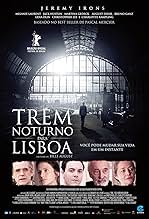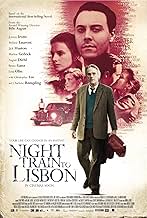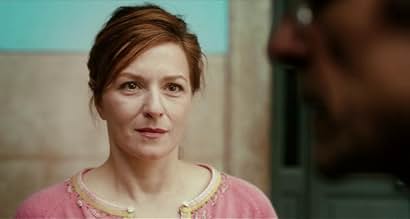Raimund Gregorius, professeur suisse, abandonne ses cours et sa vie enfermée dans le silence pour se plonger dans une aventure palpitante qui le fera voyager au plus profond de lui.Raimund Gregorius, professeur suisse, abandonne ses cours et sa vie enfermée dans le silence pour se plonger dans une aventure palpitante qui le fera voyager au plus profond de lui.Raimund Gregorius, professeur suisse, abandonne ses cours et sa vie enfermée dans le silence pour se plonger dans une aventure palpitante qui le fera voyager au plus profond de lui.
- Réalisation
- Scénario
- Casting principal
- Récompenses
- 3 victoires et 3 nominations au total
- Catarina Mendez
- (as Sarah Spale-Bühlmann)
Avis à la une
The movie looked exact copy of a novel, like I read some novel. The story telling which transforms the screen constantly between now and 70s were clearly maintained with its destination until the last 10- 20 minutes. Once you know the final conclusion, you may say is that it's because some of you might expect something bigger. But the middle aged or older guys who had experienced life very well will know the meaning of it. Yeah I believe the movie might more suitable for those kinda audience than youngsters.
It was a nice performance by such a great British actor Jeremy Irons. Like I said the story had two diversions, one which set in present time and another in 70s. The present time tale was totally ruled by Jeremy Irons, I liked it more than the 70s tale. The problem with flashback story was its ending, it was very simple especially I expected bit detailed explanation behind character Amadeu's death. And also his failed relationship with Estafania could have been more reasonable. However I am not disappointed with the movie, it was a quite nice drama, in fact awesome. I am not a book fanatic but I love movies based on the novels especially movie like 'Night Train to Lisbon' I won't miss. I say you must go for it if you like the movies which gives more priority to innovative characters than usual theme.
8/10
The film was nominated for six Sophia Awards _ the national film awards of Portugal _ including best picture, and won three, for best supporting actress (Beatrice Bartarda), best art direction and best make-up.
Directed by Bille August ("Pelle the Conqueror"), "Night Train to Lisbon" was adapted from a philosophical novel by Swiss author Pascal Mercier.
Mercier's quotations are spoken in voice-over by the film's protagonist, Raimund Gregorius, played by Oscar winner Jeremy Irons, a quiet, lonely classical studies professor working in Bern, Switzerland, who rescues a young woman about to leap off a bridge and after she disappears, finds himself on a quest to Lisbon, not only to find her but to fully understand the story of a doctor-turned-poet whose book he discovers in the pocket of the coat she leaves behind.
The story isn't as dense or contrived as it sounds, thanks to the deft screenplay by Greg Latter and Ulrich Herrmann, and the uniform commitment to character and plot by Irons and a cast that includes veterans Tom Courtenay, Charlotte Rampling, Christpher Lee and Lena Olin.
It's the kind of story that sucks us in because it's a kind of "getaway" piece: Who doesn't daydream in a Walter Mittyish way of getting away from it all and taking off on an historical detective story, which is what this is.
Once in Portugal, Irons' Gregorius sets about on a quest for the author but instead finds his sister, Adriana (Rampling as the mature version, Batarda as the younger), and learns that Amadeu died in 1974 and that only 100 copies of his book were printed. The sister has six of the books and, wondering what happened to the rest, is delighted to find that her late brother's limited edition work found an audience beyond her country's borders. Thus, a tenuous but all-important bond is formed between the soft-spoken, insightful professor and the poet's sibling.
The movie intersperses Raimund's investigation with flashbacks to a past in which we meet the young Amadeu (a superb Jack Huston), a member of the resistance to the dictatorship of António Salazar.
Through Adriana, Raimund meets the priest (Lee) who taught Amadeu, Amadeu's best friend, Jorge (Bruno Ganz in the older version, August Diehl in the younger), and learns of Estefania (the fiery Mélanie Laurent), a resistance fighter who was Jorge's girlfriend until she met and fell instantly in love with the handsome Amadeu.
After Raimund breaks his spectacles, he meets a sympathetic optician Mariana (Martina Gedeck) who by happenstance has an uncle named Joao (Courtenay as the elder version, Marco D'Almeida as the youthful one) who was also a member of the resistance and fills in the story. Late in the film, the strings of the plot are pulled together when Raimund finally meets the mature Estefania (a stunningly beautiful and completely believable Olin).
As I said, "Night Train to Lisbon" isn't for everyone, especially for those accustomed to tons of action and instant gratification via computer wizardry and slam bang eye-for-an-eye retribution, but it did it for me. It's extraordinarily literate and sumptuously photographed to boot, and it's not a stretch to say it contains threads of David Lean's wonderful 1965 film version of "Doctor Zhivago," albeit on a much smaller scale.
I was especially drawn to Irons' professor, a sensationally muted performance that holds the whole thing together.
Since you'll probably be watching this in your living room, "Night Train to Lisbon" is rated R (under 17 requires accompanying parent or adult guardian) for a scene of violence and brief sexuality (which really aren't all that bad).
A friend says: "Only the people that are alive and have the memory of you can be the true witnesses of your existence on Earth, otherwise - have we been really alive?!...".
You meet people every day in your life, but it is just when you collide with them - voluntarily or not, when they share their life with you and you share yours with them.
I encourage you to take this train. Its worth it! :)
It is a correct adaptation based on the international best selling novel written by Pascal Mercier from the award winning director Billie August . This moving film contains suspense , plot twists , a love story , thrills , emotional intrigue and political events . This is a thought-provoking film proceeded in real sense and high sensibility . Though rather existential and thinky, it is ultimately charming . Director Billie August brings out the story through a series of flashbacks . Each flashback is a piece of the puzzle, framing the story and slowly filling in the center until the final piece unsatisfyingly drops into place to resolve the whole . The flashback technique has been used and re-used from ¨Citizen Kane¨ (1941), known by some as the best movie of all time, it gave the world the first plot device by means of flashbacks , following to ¨The Godfather¨ and recently ¨The hours¨ until today we are faced with ¨Night Train to Lisbon¨ (2013), a film destined for repeated use as schedule filling on inventory-building, loved by some attracted by the name of Jeremy Irons and ignored by everyone else . Very good acting from Jeremy Irons as an aging Swiss professor of classical languages , Jack Huston a young Amadeu , gorgeous Melanie Laurent as a mysterious revolutionary girl , Martina Gedeck as Mariana and August Diehl as Young Jorge O'Kelly . Furthermore , the veterans Tom Courtenay , Lena Olin and Bruno Ganz . And special mention to Charlotte Rampling , though Vanessa Redgrave was originally cast for the role of Adriana De Prado, however Rampling replaced her.
The motion picture was well directed by Billie August who repeats similar formula to ¨House of the spirits¨ as German production , Lisboa filming , international cast and Jeremy Irons as main starring . Twice winner of the Palme d'Or at the Cannes Film Festival for Pelle the conqueror (1987) and The best intentions (1992) , Billie August is an expert on literary adaptations such as ¨Les Miserables¨, ¨Smilla's Sense of Snow¨ , ¨House of the spirits¨, ¨Marie Kroyer¨, ¨Jerusalem¨ and this ¨Night Train to Lisbon¨ . Rating : Better than average , worthwhile watching . The picture will appeal to Jeremy Irons fans .
A remarkable movie, with shades of magic and threads of a true national angst still resolving in contemporary Portugal. I just returned from a visit there and can sense some vestige of another era in the buildings, but not in the people. The era of dictatorship is no longer visible to the tourist.
But that is the meat of the movie, set after Salazar's long reign, and with the aftermath of memories and lost ones still mourned. But it's all told (based on a novel by a Swiss writer) as if in a dream, or in an individual's search through imprecise information and people who don't always talk about it the way you might expect. It's a series of small surprises, elegantly wrought.
So in all these ways it's a powerful movie. It's small and intimate, however, not an epic about this great turning point in Portuguese history. In a way it's appropriate, because I found the people there less exuberant and more contemplative than the Spaniards next door. There are always a million reasons for such things—climate, outside cultural influences, etc.—but it's so true that the movie is actually terribly honest. It reveals the truth, in little facets, and never complete.
The star certainly is Jeremy Irons, who plays the leading role with tenderness and quiet certitude. He's terrific, and perfect for this part. Also appearing is Charlotte Rampling who has a knack for small, odd, but critical roles in offbeat movies. The cast is wide, and in the many flashbacks the characters gradually intersect in different ways, revealing their personal connections to the political strife of the times.
Good stuff? Excellent stuff! I liked it more than I expected to. It's slow at times, and maybe (if you are not paying attention) a hair confusing, but give it a go if you are inclined at all. A serious, brooding but not depressing drama about, in the end, relationship. As all the best movies are.
Le saviez-vous
- AnecdotesThe title of the book written by the character Amadeu "Um Ourives das Palavras" is Portuguese for "A Goldsmith of Words."
- GaffesWhen Raimund is on the Bern Train Station, he is thinking whether he goes on board or not. The train starts to move and the doors are still open, which nowadays it would be impossible in trains of that dimension for security reasons. Although the error was needed to give more tension to the scene, it is still a thing that would never occur nowadays.
- Citations
Amadeu: We leave something of ourselves behind when we leave a place. We stay there, even though we go away. And there are things in us that we can find again only by going back there. We travel to ourselves when we go to a place. Now we have covered the stretch of our lives, no matter how brief it may have been.
- ConnexionsReferenced in Le client (2016)
- Bandes originalesLisboa
Composer: Annette Focks
Portugese Guitar: Damiel Pircher
Sound Mixer: Tom Tautorat
Recording & Mix Studio: Emil Berlin Studios
Meilleurs choix
- How long is Night Train to Lisbon?Alimenté par Alexa
Détails
- Date de sortie
- Pays d’origine
- Site officiel
- Langues
- Aussi connu sous le nom de
- Tren nocturno a Lisboa
- Lieux de tournage
- Sociétés de production
- Voir plus de crédits d'entreprise sur IMDbPro
Box-office
- Budget
- 7 700 000 € (estimé)
- Montant brut mondial
- 12 020 387 $US
- Durée1 heure 51 minutes
- Couleur
- Mixage
- Rapport de forme
- 1.85 : 1
























